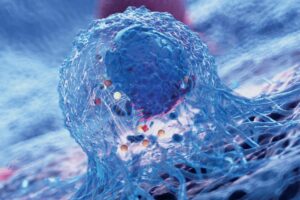What is already known
Scientists have known that the composition of the gut microbiota can affect responses to immunotherapy, which releases a break on specific immune cells called T cells, allowing them to recognize and destroy tumors. However, the role of the microbiota in immunotherapy is still not well understood.
What this research adds
Researchers have found that blocking TREM2 — a protein that prevents T cells from attacking tumors — boosted the effectiveness of anti-PD-1 tumor immunotherapy. In mice lacking TREM2, improved responses to anti-PD-1 therapy were associated with changes in their gut microbiota, particularly higher levels of Ruminococcus gnavus. Administering R. gnavus orally to mice before anti-PD-1 treatment led to increased responses to the drug, tumor shrinkage and the migration of gut-derived T cells to tumors.
Conclusions
The findings suggest that — at least in mice — the combination of anti-PD-1 immunotherapy with a lack of TREM2 generates a gut environment that promotes inflammation, which improves tumor rejection.
Immunotherapy — a treatment that stimulates a person’s immune system to kill tumor cells — has showed promise against various types of cancer, including melanoma and lung cancer. However, just about one in five cancer patients respond to the treatment. Now, a study in mice shows that a specific strain of gut bacteria can boost the effects of cancer immunotherapy.
The findings, published in Science Immunology, add to evidence that gut microbes may help enhance the effectiveness of immunotherapy against cancer.
“The microbiome plays an important role in mobilizing the body’s immune system to attack cancer cells,” says study senior author Marco Colonna at Washington University in St. Louis, Missouri. “Our findings shine a light on one bacterial species in the intestine that helps an immunotherapy drug eliminate tumors in mice.”
Scientists have known that the composition of the gut microbiota can affect responses to anti-PD-1 drugs, which release a break on specific immune cells called T cells, allowing them to recognize and destroy tumors. However, the role of the microbiota in immunotherapy is still not well understood.
Colonna and his colleagues previously found that inhibiting a protein called TREM2 successfully eradicated sarcoma tumors in mice. TREM2 prevents T cells from attacking the tumor and is produced by tumor macrophages — a type of immune cells found within the tumor microenvironment. This time around, the team set out to analyze the gut microbiota of mice that responded to immunotherapy.
Microbial alterations
The researchers found that anti-PD-1 treatment became more effective when TREM2 was blocked, suggesting that the protein reduces the efficacy of immunotherapy. In mice lacking TREM2, an increased response to anti-PD-1 drugs was linked to changes in the animals’ gut microbiota, the researchers found.
In particular, mice that responded to immunotherapy had higher levels of the gut microbe Ruminococcus gnavus than those that did not respond to the therapy.
R. gnavus has been identified in the gut microbiota of cancer patients who respond to immunotherapy, and in clinical trials, gut microbiota transplants from responders have allowed non-responders to benefit from immunotherapy.
Promoting inflammation
Next, the researchers administered R. gnavus orally to the mice before treating their tumors with anti-PD-1 drugs. As a result, mice had increased responses to anti-PD-1 therapy and their tumors shrank. Administering R. gnavus also triggered the migration of gut-derived T cells to tumors and boosted the expression of inflammatory genes in macrophages.
The findings suggest that — at least in mice — the combination of anti-PD-1 immunotherapy with a lack of TREM2 generates a gut environment that promotes inflammation, which improves tumor rejection.
“It will be important to validate this concept in the human population by searching for correlations between responsiveness to anti-PD-1, enrichment of certain microbiota species, and macrophage responsiveness to environmental stimuli,” the authors say. What’s more, they add, “it will be informative to evaluate the effect of TREM2 and PD-1 blockade on gut microbial composition and any relationship to the response to treatment.”











